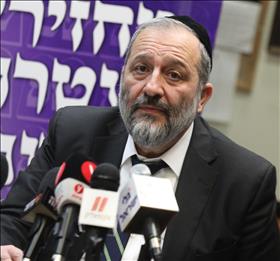The Invisible MK
How Aryeh Deri Exploits the Knesset and Escapes Responsibility
MK Deri was absent from 74% to 87% of plenary votes in the 25th Knesset, but the Knesset’s Ethics Committee imposed only a symbolic sanction by docking four days’ salary
22/08/2025 08:15
Tags: Aryeh Deri · Knesset

Aryeh Deri. Photo credit: Yosi Zamir, via ShatilStock
In recent weeks, the Knesset’s Ethics Committee finally convened to examine the repeated absences of MK Aryeh Deri (Shas) from parliamentary duties (along with other absentee MKs, who were absent for significantly fewer sessions and votes).
The outcome was a grave disappointment. Rather than holding Deri to account for his blatant disregard of the responsibilities of an elected official during six consecutive terms, the committee chose to impose only a symbolic sanction by docking four days’ salary. This leniency not only undermines the integrity of the Knesset but also raises troubling questions about the rule of law and the political protection afforded to powerful figures.
Data published by the watchdog group “Shakuf” shows that Deri’s pattern of absence is unprecedented: he did not meet the minimum requirements during every term of the (current) 25th Knesset. In the third session of the current Knesset, he was absent for 81% of plenary votes; in the fourth session, his absences climbed even higher, to 87%; in the fifth and sixth sessions, he missed 74% and 76% of votes respectively.
This is not a one-time lapse but a systematic abandonment of his duties. An MK’s role is not ceremonial. It involves attending debates, voting on legislation, participating in committees, asking questions, initiating bills, and representing the public interest. Yet Deri has done virtually none of this. Since the beginning of the 25th Knesset, he has spoken in the plenum only three times, submitted no parliamentary questions, and initiated just one bill. He does not sit on any committees. He continues to draw a full salary and enjoy the considerable financial perks of office, but he does not fulfill the job for which the public elected him.
The Ethics Committee accepted some of Deri’s claims to justify his absences, such as mourning his late brother or attending cabinet meetings. But the Supreme Court has ruled that Deri cannot serve
Hiddush believes that when MKs like Aryeh Deri disregard their duties, they betray the public that elected them
as a minister because of his criminal record and the severe damage such an appointment would cause to public trust. At most, he has attended cabinet discussions as an observer, not in any official capacity. His presence there does not release him from his obligations as a Member of Knesset.
Instead of confronting these facts, the Ethics Committee has looked the other way. By imposing only minimal sanctions, it conveyed a message that the rules do not apply equally to all. Ordinary MKs have been sanctioned much more harshly for far less. In the history of the Knesset’s Ethics Committee, there has been no comparable case of an MK repeatedly shirking his duties across multiple consecutive sessions with such impunity.
Hiddush believes that this is not merely an internal parliamentary matter but one that strikes at the heart of Israeli democracy. When MKs like Aryeh Deri disregard their duties, they betray the public that elected them and damage the credibility of the Knesset as an institution. When the Ethics Committee fails to enforce accountability, it undermines the rule of law and feeds the corrosive perception that political power grants immunity from responsibility.
Hiddush therefore calls for:
• Maximum sanctions against MKs who systematically evade their duties, including full docking of a year’s salary and revocation of benefits such as advisors, office budgets, and transportation.
• Clear and transparent criteria for MK activity, ensuring that benefits are tied to actual parliamentary work.
• Regular reviews of attendance and activity, with the Ethics Committee convening after each session to impose sanctions where necessary.
At stake is more than Aryeh Deri’s record. This is a test of whether Israeli democracy will hold elected officials accountable to the standards expected of them. The Knesset cannot function if members are allowed to treat their position as a title without responsibility.
Citizens deserve representatives who take their role seriously. If the Ethics Committee refuses to enforce this, it is up to civil society and the courts to ensure that the principle of accountability prevails.